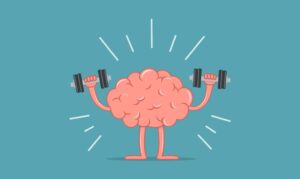
There is a saying – “That Food is the most over abused anxiety drug and Exercise is the most underutilised antidepressant” In many cases this is very true. If we look at how obesity can be linked to emotional eating in the case of sadness/depression/anxiety leading some people to turn to food and binge eating similar to a drug addict abusing drugs. When instead they should be considering the massive mental health benefits that exercise can provide.
Depression is a very common condition which affects more than 450,000 (1 in 10) people in Ireland at some point in their life. Since I work in an addiction rehabilitation centre I have a first hand look at what exercise can do for recovering addicts, many of whom are also suffering with depression and other anxiety issues. From Supervising their PE sessions over the years I can without doubt say that the residents are like totally different people, both physically & mentally, from the time they start to when they finish their workouts. During their workouts I can literally feel the negative energy and emotions being burnt off like hot steam bursting from a pipe.
So if this type of emotional release through exercise is not only healthy and essential for people who are in rehabilitation then it should go without saying that the average person suffering with depression/sadness, anxiety and other mental issues can surely benefit also.
Research
There has been a lot of research put into the effectiveness of exercise when compared to drugs for treating people with depression and other anxiety issues.
In one study scientists divided 156 men and women with depression into three groups. One group took part in an aerobic exercise program, another took the SSRI sertraline (Zoloft), and a third did both. At the 16-week mark, depression had eased in all three groups. About 60%–70% of the people in all three groups could no longer be classed as having major depression. In fact, group scores on two rating scales of depression were essentially the same. This suggests that for those who need or wish to avoid drugs, exercise might be an acceptable substitute for antidepressants. Keep in mind, though, that the swiftest response occurred in the group taking antidepressants, and that it can be difficult to stay motivated to exercise when you’re depressed.
A follow-up to that study found that exercise’s effects lasted longer than those of antidepressants. Researchers checked in with 133 of the original patients six months after the first study ended. They found that the people who exercised regularly after completing the study, regardless of which treatment they were on originally, were less likely to relapse into depression
– Source : Harvard/Archive of Internal Medicine 1999 –
Mental Benefits Of Exercise
Doing exercise may seem like the last thing you want to do when you’re feeling depressed or anxious but once you get started you will soon feel the benefits and wonder why you didn’t start sooner. Just a simple 30 minute walk per day can have benefits such as :
-
Increased “feel good” hormones release like Endorphins & Serotonin
-
Increased blood flow and oxygen to the brain & body helping to clear the mind
-
Elevated mood and self esteem
-
Reduce stress and anxiety
-
Regular exercise can improve sleeping patterns which is essential for optimal brain function
Types Of Exercise
When we think of exercise we often think about long gruelling workouts in the Gym jam packed with people and that might be the last thing that you want or need. Actually you may never have to set foot inside the door of a gym to have an effective workout.
Of course the Gym or Leisure centre offers a very safe environment to train in and it has all the equipment you may need. But if the Gym isn’t for you then there are plenty of alternatives to be had in the great outdoors such as Walking the dog, Jogging, Cycling, Hiking, Trail walking and even Gardening. Exercising outdoors also has the benefit of getting you out of the house and into the fresh air and the change of scenery will do your mind the world of good.
Research has shown that it isn’t the intensity but more the frequency of exercise which has the most effect. So, for example 30 mins of moderate exercise 5-6 times per week is more effective than 3 two hour workouts per week but obviously any amount of exercise is better than no exercise at all.
Conclusion
If you’re unsure or confused about how to start an exercise regime, then seeking the advice of a fitness professional would be a great place to start. Also consult with your GP before commencing a fitness regime but I’m sure they will be more than encouraging on the matter.
So by the time you finish reading this article, why don’t you make up your mind to take the first step and put on a pair of comfortable shoes and head outside for a walk around the block or in the local park and see how you feel. I’m positive you won’t regret it.
